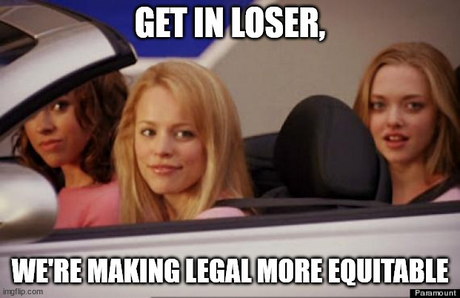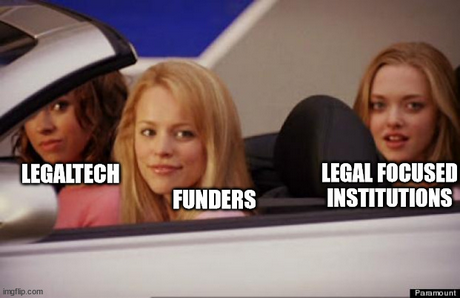Earlier this morning, while waiting to take a phone call about some of my volunteer work <sigh>, I was perusing LinkedIn. Someone (1) posted about the concerns they have about posting about A2J stuff and how that might affect their business relationships.
I’ve had the same worries over the years, more so in recent years because I’ve been working for in start ups which are essentially small businesses and I don’t want to wreck someone else’s dream. But a decade or so ago, when I was younger, working for larger academic orgs, and more passionate (by which I mean unmedicated) it felt like less of a concern. Also, I was pretty open about everything on several public platforms so surely people knew what they were getting when they hired me, right?
As it turns out, no one expects The Spanish Inquisition The Full Sarah Glassmeyer Experience.
While generally my attitude towards people that don’t want to hire me or work with me because I am what can be described as “Legaltech’s Neighborhood Busybody” or a “Humorless Scold”(2) is “Fuck ’em if they can’t take a joke”, I do acknowledge that there are layers to all of this and it’s not just me that I have to consider. And other people have to make these same calculations for themself.
Anyhoo, this was my response/comment to the above mentioned LinkedIn post:
I tend to agree with the sentiment that “law is the operating system of a society” and that legal practitioners of all levels and in all practice areas have a responsibility to ensure that it continues improving and moving towards operating more efficiently and equitably. If we want law to continue to be treated as a special professional sphere (for many definitions of that), and not just a different type of business professional, then we need to be willing to be educated and educate on the variety of problems that need to be addressed.
Law is a very hierarchical system and profession and unfortunately those in the upper echelons are the ones that can most greatly create change while at the same time being the ones least affected by the problems. So many of the problems that we call “access to justice problems” affect every participant in legal proceedings, it’s just that some people are better equipped to survive them. Fixing them helps everyone and the key is to make them see that. But first they have to be aware of the problems.
There’s definitely going to be a subset of people that may mute you or unfollow you because what you post makes them uncomfortable. They’re probably not someone you want to work with anyway.
– Sarah Glassmeyer, a person who spends more time than is reasonable on LinkedIn
Or, you know, fuck ’em if they can’t take a joke. (3)
But what comes after educating/being educated on a problem?
Well, this has all been a bit of a preamble to what I actually want to talk about:
Say you’ve read enough posts on LinkedIn and elsewhere about Access to Justice and you realize there’s a problem. You want to do something, but what? Good news, my friend, I have a list. I’ve actually had this list for a while but didn’t think to post it until now.
And another piece of good news is that there’s plenty of work to go around and opportunities suitable for all sorts of levels and types of skills. Some are available for individuals and some should be taken on at an institutional level (bar associations, professional associations, legal ed, newly created Communities of Practice (4), etc.)
I tried to break it down by the needs of each involved group, and yes, everyone is going to need help. I’m a little fuzzy on the needs of legal institutions which is ironic since that’s where I’ve spent the majority of my professional life. Probably related to my habit of just muscling through and being unwilling to ask for help when I need it. Ah, well, another thing to unpack in therapy. But if you have suggestions, chime in.
So here’s an initial and non-exhaustive list of things needed by the various players in the legal tech and people law worlds (5):
Needed by A2J orgs and Small/Solos
- Education on how to evaluate legal tech tools
- Education and playbooks for acquiring legal tech tools
- User groups around specific products for info sharing, similar to libraryland’s Triple I user group. <whisper>honestly everyone in legal could use these </whisper>
- Curated directory of A2J practice legal tech and related tools
- List of existing legal tech companies that provide free or discounted subscriptions to A2J Providers
Needed by legal tech providers
- Education on needs of lay users of legal tech
- Education and advice for navigating regulatory framework for creating public service tools
- Warm introduction to potential A2J customers
Needed by funders
- Introduction to companies that are creating A2J tools that they may be interested in funding
- Introduction to A2J service provider projects that need funding.
Do you see something in there you can do? Do it. I know a lot of people wait to be asked to do something so consider this me doing that to you.
People in Chicago are very fond of this quote of Danial Burnham:
Make no little plans. They have no magic to stir men’s blood and probably themselves will not be realized. Make big plans; aim high in hope and work, remembering that a noble, logical diagram once recorded will never die, but long after we are gone will be a living thing, asserting itself with ever-growing insistency. Remember that our sons and grandsons are going to do things that would stagger us. Let your watchword be order and your beacon beauty. Think big.
Daniel Burnham, Chicago architect. He did the Exposition of 1892 among many other things
I’m a big admirer of Burnham and that quote but honestly F that guy. Make small plans. Get shit done. Your plan to help A2J/people law world doesn’t have to be a huge national project. It can be very small and very localized. And don’t be shy about telling people what you’ve done so they can learn from that and replicate successes without duplicating effort.
FOOTNOTES
(I thought there was a way to do this for real with hyperlinks but I can’t find it and I’m not hand coding in anchors.)
(1) happy to give credit but also occurred to me that LinkedIn is a bit of a walled garden and perhaps I should get permission before putting people’s content in my open prairie
(2) Can you believe some people really don’t think I’m funny? Ridiculous. I am objectively hilarious.
(3) I still get nervous about using profanity in my writing after getting in TROUBLE for it at a previous job but this is a common American phrase and I can’t bowdlerize it or think of a great alternative so I guess you’re gonna have to clutch the pearls.
(4) Every now and then I think about starting my own professional education organization/group and I’m counting on you to hold an intervention if you see me making a move to do that.
(5) Also, as always, everyone needs more access to and space to develop open source tools and content but didn’t make explicit here. Just assume I always think that is an answer to every question I’m asked.




Excellent. I’m set to retire after 44 years “at the bar”. The B.C. Gov. has passed a law to reform the regulation of the Legal Professions, and “they” (the lawyers) are not to happy about it. I’ve used the term “moral panic” to describe what is going on. See, for example, https://vancouversun.com/news/local-news/b-c-lawyers-independence-under-threat-with-new-law-says-law-society-as-it-sues-province